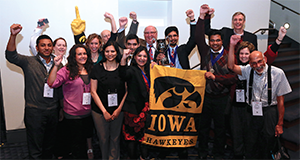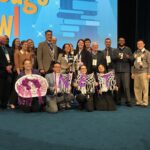
Black Jack/shutterstock.com
Did you know that the ACR holds an annual Knowledge Bowl competition in conjunction with the ACR/ARHP Annual Meeting? Two fellows, along with a faculty mentor, compete in two to three rounds of trivia, modeled on the television game show Jeopardy!
For the past three years I have participated, along with my team, the University of Iowa Hawkeyes. We’ve been able to secure the championship each year, as well as the traveling trophy. By our count, we have prevailed over 41 different teams from across the nation and the world. Every time we get off the stage, we are asked about the secrets of our success. Well, here they are:
- Don’t learn new things. Keep remembering old things. The average rheumatology fellow has at least seven years of training behind him or her and has taken countless examinations. We know that it’s not about how much you can learn, but rather how much you can retain. Chances are that at some point or another, you have known most of the answers in the Knowledge Bowl, but you just can’t remember them. That’s why repetition is so important. Keeping those facts in your mind and connecting them to the world around you build the scaffold that is necessary for victory.
- The team is more than three people. It’s an entire department that sits behind you. One of the most frightening (or thrilling, depending on your point of view) things about participating in the Knowledge Bowl is having all eyes on you. But the fact is that there’s a whole host of people who are enabling you to be on stage. Your division’s support is absolutely pivotal. Whether financial (the ability to cover your travel and stay), didactic (educational sessions like board review and journal club), time (providing time to study instead of just writing notes and calling patients) or moral (career mentoring and advice), support from the division is a prerequisite for eventual victory. The rheumatology half of our Division of Immunology has been extraordinarily supportive in all of these ways.
- Think broadly, and make new connections. Despite myths to the contrary, the questions in the Knowledge Bowl aren’t straight recall. They require some higher-order skills that connect one thing to another. Images, which constitute a large proportion of questions, cannot simply be memorized. Instead, they require keen diagnostic skills, linking physical examination or radiographic interpretation with pathophysiology and other concepts. Other questions are framed in varying contexts, such as Rheum in the Kitchen, which require integration of knowledge in rheumatology with fields that you may not necessarily associate with work.
- Keep reading The Rheumatologist. For 800 points, do you know what MIPS is? You probably do if you regularly read The Rheumatologist, which covers these sorts of topics. The Rheumatologist is a fantastic resource for fellow education, providing updates regarding the art and science of rheumatology, but also the practical aspects that occasionally pop up. Of course, it would be ideal to read Kelley’s Textbook of Rheumatology from cover to cover, but the
 fact is that nobody can memorize and apply such a voluminous text. Moreover, having too much in your brain may lead to overthinking and actually hurt you when you get on stage. Apart from The Rheumatologist, other sources that I have used include Rheumatology Secrets and the Primer on the Rheumatic Diseases, as well as the ACR/ARHP journals, Arthritis & Rheumatology and Arthritis Care & Research.
fact is that nobody can memorize and apply such a voluminous text. Moreover, having too much in your brain may lead to overthinking and actually hurt you when you get on stage. Apart from The Rheumatologist, other sources that I have used include Rheumatology Secrets and the Primer on the Rheumatic Diseases, as well as the ACR/ARHP journals, Arthritis & Rheumatology and Arthritis Care & Research. - Work strategically to earn points. Knowledge is only half the battle. The other half is strategy. Playing on the sidelines, it may seem frustrating that many smart players aren’t buzzing in for easy questions. I assure you it’s not that they don’t know the answers; rather, it’s that they know the consequences of a wrong answer. If you are 80% certain about a 200-point question, then it may be worth your while to buzz in, but if the question is for 1,000 points, then even that degree of uncertainty may prompt the wise player to become a little gun shy. Similarly, if your team is running ahead, it’s best to play more conservatively rather than when you’re behind and are desperate to run up the score. Another important point is to know when to buzz in. Occasionally, we had very aggressive competitors who buzzed in at the earliest possible time before even reading the question. They seemed to amass points early in the game, only to defeat themselves later on as the game became more difficult and unpredictable. To be fair, our very own team has also been accused of being “trigger happy,” but that is because of another secret. We read the question backward, starting with the “this,” as a way to get a leg up on the competition.
- Maintain your focus. There’s a very strong psychological element to playing in the Knowledge Bowl. After all, when you answer a question correctly, you not only win points, but you also have control of the board. Sweeping a category can rattle and demoralize opponents. At the same time, it can prompt an overconfidence that can lead to unforced errors and drain away all those previously hard-earned points. Speaking from personal experience, I have found that the loss of a high-value question led to a reluctance in buzzing in and that it took quite some time to regain confidence and stride. Therefore, both the winning and the losing teams have to maintain focus and try their best to drown out the temporary ups and downs of the competition.
- Never forget that the competition is for fun. Over the past three years, I noticed that the Knowledge Bowl has gotten a lot more competitive. When we started in 2014, it was a relatively light-hearted affair. Now, I hear that teams practice “for months beforehand” to “take us down.” Even though that drive is welcome and makes for better competition, I would contend that the real motivation for participation should be for fun. My team members and I really enjoyed being on stage, not only because we were winning (admittedly, that was fun), but because we enjoyed the challenge of it all. We thoroughly enjoyed meeting our fellow contestants, some of whom I see time and time again at subsequent ACR meetings and have become good friends of mine. More importantly, it provides a nice opportunity to shed my introverted/ambiverted self and pretend like I’m on Jeopardy! with Alex Trebek.
The call for teams is typically in the preceding spring, so keep an eye out for an announcement from the ACR. Because there are more teams than available slots, a random drawing is used to select qualifying teams. I would like to encourage anyone with a knack for trivia to apply. It has been a tremendous honor to represent my program, my institution and even my state for the past three years. I can’t imagine fellowship without it.


